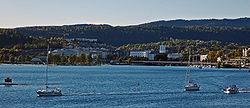Bærum
| Bærum kommune | |||
|---|---|---|---|
| Municipality | |||
 |
|||
|
|||
 Bærum within Akershus |
|||
| Coordinates: 59°56′18″N 10°30′24″E / 59.93833°N 10.50667°ECoordinates: 59°56′18″N 10°30′24″E / 59.93833°N 10.50667°E | |||
| Country | Norway | ||
| County | Akershus | ||
| Administrative centre | Sandvika | ||
| Government | |||
| • Mayor (2011) | Lisbeth Hammer Krog (H) | ||
| Area | |||
| • Total | 192 km2 (74 sq mi) | ||
| • Land | 189 km2 (73 sq mi) | ||
| Area rank | 334 in Norway | ||
| Population (2010) | |||
| • Total | 113,659 | ||
| • Rank | 5th in Norway | ||
| • Density | 547/km2 (1,420/sq mi) | ||
| • Change (10 years) | 9.8 % | ||
| Demonym(s) | Bæring | ||
| Time zone | CET (UTC+1) | ||
| • Summer (DST) | CEST (UTC+2) | ||
| ISO 3166 code | NO-0219 | ||
| Official language form | Bokmål | ||
| Website | www |
||
|
|
|||
Bærum (Norwegian pronunciation: [²bæːrum] (![]() listen)) is a municipality in Akershus county, Norway. The administrative centre of the municipality is the town of Sandvika. Bærum was established as a municipality on 1 January 1838. A suburb of Oslo, Bærum is located on the west coast of the city.
listen)) is a municipality in Akershus county, Norway. The administrative centre of the municipality is the town of Sandvika. Bærum was established as a municipality on 1 January 1838. A suburb of Oslo, Bærum is located on the west coast of the city.
Bærum has the highest income per capita in Norway and the highest proportion of university-educated individuals. Bærum, particularly its eastern neighbourhoods bordering West End Oslo, is one of Norway's priciest and most fashionable residential areas, leading Bærum residents to be frequently stereotyped as snobs in Norwegian popular culture. The municipality has been voted the best Norwegian place to live in considering governance and public services to citizens.
The name (Old Norse: Bergheimr) is composed of berg which means "mountain" and heimr which means "homestead" or "farm". It has probably originally belonged to a farm located at the base of the prominent mountain of Kolsås. In Old Norse times, the municipality was often called Bergheimsherað meaning "the herað (parish/ district) of Bergheimr".
The coat-of-arms is from modern times. They were granted on 9 January 1976. The arms show an old silver-colored lime kiln on a green background. This was an important aspect of the local economy from the Middle Ages until around 1800. There are still some original ovens visible in the municipality.
...
Wikipedia


